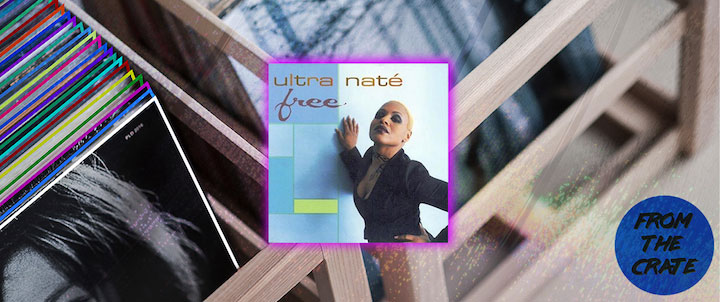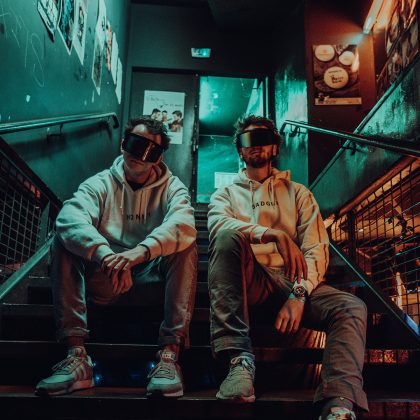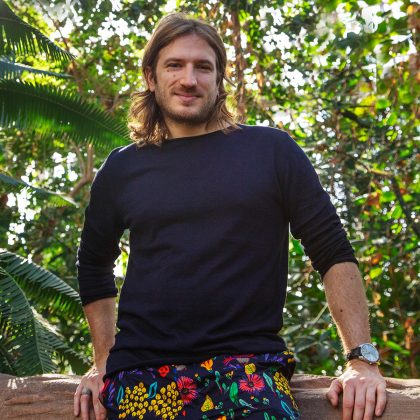Ultra Naté “Free”
The birth of our underground brand Factory 93 not only brought on an adrenaline rush reminiscent of the renegade warehouse era of raving—on which Insomniac was founded—but it also had us thinking back to all the people, places and parties that made this whole operation possible. And with that came a burning desire to crack open our collection and dust off the classic records we couldn’t live without. Through our From the Crate series, we break out both seminal and obscure cuts alike, imparting some knowledge in the process.

House music’s roots grow from struggle. For all the purpose-built infrastructure and escapism now associated with dance culture, what sprouted from the cross-pollination of soul, funk, Latin, R&B and gospel records was seeded in pockets of socially, sexually, racially marginalized people sweating out the challenges of life in solidarity.
It may seem strange to preface the story of a chart-topping, high-energy, vocal house anthem with a nod to early disco’s isolated communities, but even a track as widely embraced as Ultra Naté’s “Free” began with a desire to transcend frustrations and setbacks.
Naté—a Maryland-born and -bred singer-songwriter, DJ, producer, promoter and in-demand diva—was no stranger to the Billboard Dance Club Songs chart when “Free” peaked at No. 1 for two weeks in the first half of July 1997 (while also enjoying a run in the UK Top 10).
Naté had charted multiple times in the early ‘90s following her 1991 debut Blue Notes in the Basement, yet the success of a single meant to embody independence that felt to her like a perfectly timed vindication.
On the surface, “Free” is associated with empowerment, spiritual release, the acclamation to “do what you want to do.” It’s an almost mandatory directive to shed uncertainty and inhibitions. Both the track and its history, however, begin with an undercurrent of yearning and tension.
You can hear it in the descending harmony of the guitar part that kicks off and creeps beneath “Free,” a melancholic, bittersweet prelude that broadens into a staccato groove threaded with the influences of Nile Rodgers, melodramatic college rock, the Paradise Garage, and the knowledge that the industry animal, but not its ear, was changing.
Naté had been set free years before expressing the sentiment in song. Originally signed to Warner Bros. Records through the company’s UK office, she had been transferred to the label’s US arm for her sophomore album, 1993’s One Woman’s Insanity. In the UK, she’d been on Top of the Pops—but in the US, it felt like endless red tape. Incapable of capitalizing on her club credibility, Warner eventually dropped Naté in 1993.
“I’d had great experiences, but when response for the second album was moderate, I wondered if it was time to walk away and go back into my studies.”
“They weren’t quite sure what to do with me,” reflected Naté recently when asked to describe the majors’ mentality at the time. “‘You’re not quite R&B, but are sort of, and aren’t quite gospel, but are sort of. But you are clubby, and we really don’t know what to do with that.’”
Speaking from her home in Baltimore, Naté described the period of unpredictability preceding the sessions that produced “Free.”
“I had originally planned to go into medicine, when I accidentally fell into the music business. I’d had great experiences, but when response for the second album was moderate, I wondered if it was time to walk away and go back into my studies. I decided not to give up on all these amazing creative outlets I had found, but I only had $50 in the bank and my reputation, no real-world budgets, to work for me. So, I talked it over with my manager, Bill Coleman, and we agreed I should write with various producers to build an album while we shopped for a deal away from the majors.”
“Free” would emerge at a volatile time for dance music. In the wake of Trainspotting and the crossover popularity of Underworld’s “Born Slippy .NUXX,” among other factors, labels were ready to market “electronica” as easily accessorized rebellion. Even U2 was courting the clubs with numerous remix packages off the band’s “DJ and vibes”-influenced pop album. Money was being thrown at the synth crowd, but only if you could be sold like a mainstage act.
Naté, however, wanted to break back through the post-garage underground, eventually signing with Gladys Pizarro to put out a 12″ on New York’s Strictly Rhythm. At the same time, Naté began to collaborate in the Strictly Rhythm studio with producers Mood II Swing—the duo of Lem Springsteen and John Ciafone—who, like Naté, had support from DJs including “Little” Louie Vega, promoting Nuyorican soul in Manhattan, and Tony Humphries, who nurtured vibes-rich house at Zanzibar in Newark, NJ.
Working for a couple years to build Situation: Critical, the 1998 album that would include “Free,” Naté had her roadmap for indie success. But for her first floor-filler off the record, she still took a little inspiration from an artist on her former major label.
“I was really inspired by the song ‘Losing My Religion’ by R.E.M.—the angst in the rhythm,” says Naté, giving the nod to a song somewhat appropriately named after a Southern idiom for being at the end of your rope.
“I’ve always been into blending sounds, so that’s where I thought we needed to start, but broadening the boundaries: guitars driving this heartstring-pulling energy. Mood II Swing took those references and came up with ideas, and when Woody Pak, their friend, came in to lay down guitar, it really started to come together. We danced around what we should be saying, and Lem came up with the idea of just saying the word ‘free,’ yelling it out.”
“We wanted classic rock energy, not the… dance-all-night party themes you would usually hear in house music all the time. We needed it to be bigger, something that would stand out but work everywhere—because everyone wants to be free from something minor or major in your life.”
An initial version of the track was too rock, admits Naté, so Mood II Swing dialed it back and added their syncopated percussion and liquid chords (hallmarks that would influence UK garage and broken beat). Lyrics were fleshed out, and background vocalists, arranged by Danny Madden, added breadth. The final result caught fire, first as a coveted white label at Winter Music Conference and then in deep, pop, queer hearts and clubs worldwide.
In light of the rise of tropical house and decades of Ibiza compilations, it may seem strange that the dusky, almost psychedelic guitar in “Free” was not considered de rigueur, but at the time of the track’s release, it was an outlier.
Yet it still resonates, and not just as part of Naté’s signature song. On the 20-year anniversary of “Free,” a sample of the guitar intro provided the anchor for “Paradise,” a 2017 single released by UK R&B/future bass singer MNEK as an eddy from turbulent times, another way to (temporarily) step away from injustice and desperation.





